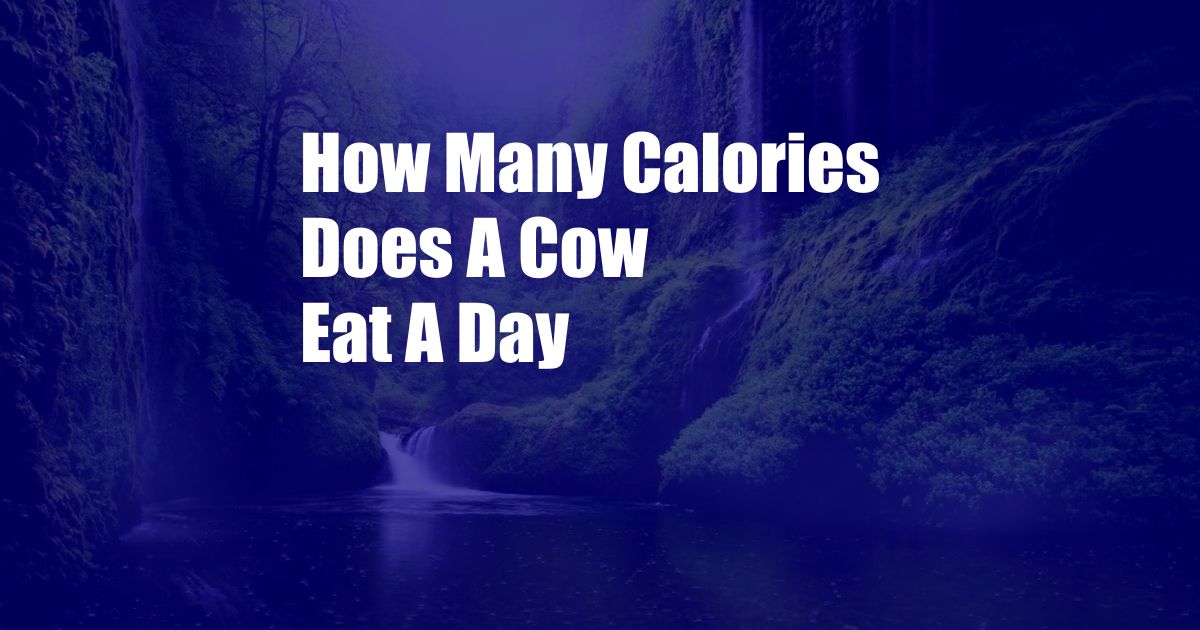
How Many Calories Does a Cow Eat a Day?
As I stood in the pasture, watching the massive cows graze peacefully, I couldn’t help but wonder about their daily calorie intake. These gentle giants, with their enormous appetites, must consume a staggering amount of food to sustain their impressive size. My curiosity led me down a research rabbit hole, uncovering fascinating insights into the voracious dietary needs of cows.
The average cow consumes approximately 40-60 pounds of food each day, which translates to roughly 12,000-18,000 calories. This prodigious appetite is fueled by their unique digestive system, designed to break down large quantities of plant matter. Cows are ruminant animals, meaning they have four stomachs that allow them to ferment and absorb nutrients from fibrous vegetation.
The Role of Fermentation
Ruminants like cows possess a complex digestive system that allows them to extract nutrients from tough plant materials. The first stomach, the rumen, serves as a fermentation chamber, where microbes break down cellulose, the indigestible component of plant cell walls. This fermentation process produces volatile fatty acids, which the cow’s body uses as a primary energy source.
The rumen’s microbes thrive in an anaerobic environment, devoid of oxygen. As the cow consumes food, it regurgitates partially digested cud and rechews it, further breaking down the plant material and exposing it to the microbes. This process ensures efficient nutrient absorption.
Feed Composition and Calorie Content
The composition of a cow’s diet directly impacts its calorie intake. The primary components of their diet are forage, such as hay, grass, and corn silage, which provide fiber, energy, and minerals. Grain supplements, like corn and soybeans, are also commonly used to boost energy levels. The specific feed composition varies depending on factors such as age, breed, and production status.
Factors Influencing Caloric Needs
Several factors influence a cow’s daily calorie requirements:
- Body size: Larger cows require more calories to maintain their weight.
- Age: Growing calves have higher caloric needs than mature cows.
- Lactation: Cows that are lactating require additional calories to produce milk.
- Activity level: Cows that are pastured or grazing freely expend more energy than those confined indoors.
- Environmental conditions: Cows exposed to extreme cold or heat require extra calories to maintain body temperature.
Tips for Cow Calorie Management
Proper calorie management is essential for maintaining cow health and productivity. Here are some expert tips:
- Monitor feed intake: Keep a close eye on how much feed your cows are consuming to ensure they are getting the right amount of calories.
- Adjust feed rations: If your cows are losing weight or not producing enough milk, consider increasing their calorie intake by adjusting their feed rations.
- Use high-quality feed: Providing cows with high-quality feed ensures they are getting the nutrients they need without overconsuming calories.
- Avoid overfeeding: Overfeeding can lead to obesity and other health problems. Consult with an animal nutritionist to determine the optimal calorie intake for your herd.
FAQs
Q: Why do cows need so many calories?
A: Cows have a large body size, a complex digestive system, and high energy requirements for growth, milk production, and reproduction.
Q: How can I estimate the calorie intake of my cows?
A: Monitor their feed intake and use a feed calculator to estimate the calorie content based on the type and composition of the feed.
Q: What are the consequences of overfeeding cows?
A: Overfeeding can lead to obesity, reduced fertility, lameness, and other health problems.
Q: How can I prevent underfeeding my cows?
A: Monitor their body condition, feed intake, and milk production to ensure they are getting sufficient calories for their energy needs.
Conclusion
The daily calorie intake of a cow is a crucial factor in maintaining its health and productivity. Understanding the factors that influence caloric needs and strategies for proper calorie management empowers farmers to optimize their cow’s well-being. By providing adequate nutrition while avoiding overfeeding, we can ensure that these gentle giants continue to thrive in our pastures and contribute to a sustainable food system.
Are you curious about other aspects of cow nutrition or animal husbandry? Let us know in the comments below, and we’ll delve deeper into these fascinating topics in future posts.